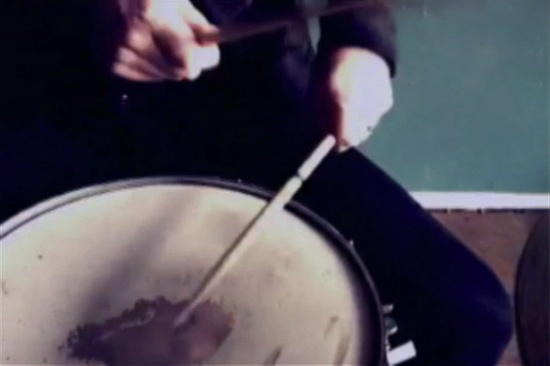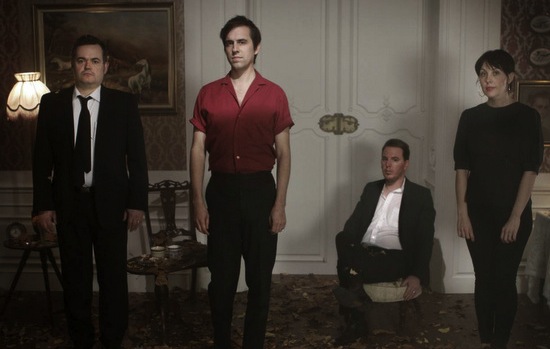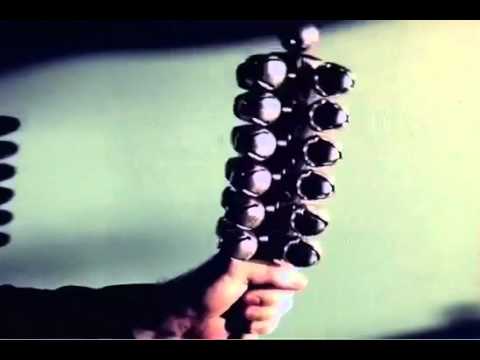"History is really crazy," says Christian Pugmire, the Seattle-to-Melbourne transplant and lyrical core of Australian-based four-piece New War, in which he’s joined by Melissa Lock, Steve Masterson and Jesse Shepherd. Brought up through the dynamic days of 90s grunge and Riot grrrl in Washington, educated at the same liberal arts college as Kathleen Hanna, Carrie Brownstein and Beth Ditto, you might think you’d have Pugmire pegged. But there’s more to him than post-punk band scenes and left-wing ideologies.
Born in Utah and raised in Washington a Mormon, Pugmire was brought up by antithetically "liberal" parents before spending his formative years listening to Nirvana, Wipers and Unwound, watching Bikini Kill, Sleater Kinney and Huggy Bear. An Anarchist collective bookstore owner of the past, record store clerk and obscure history buff of the present, Pugmire is now in his 30s, a father and US expat living in the strange and distant continent of Australia. Now he knocks around with the likes of My Disco, HTRK and Fabulous Diamonds, slipping into the occasional Australianism while still sounding especially US "Northwestern".
He’d left the "drama and conflict" of his days performing with Shoplifting, a band active in the early millennium and releasing a single album, Body Stories, on Kill Rock Stars in 2006, disbanding shortly thereafter, behind. It’s a band that also happened to boast Hannah Blilie of The Gossip as a member, a claim to fame that Pugmire would rather leave behind also, for no other reason than he’d like to talk about something else. That something else is ambling down "totally random" tangents on his love of Russian history, obscure poetry by Nikolai Kliev ("his use of language was so unlike anything I’d ever read. It completely blew my mind") and all manner of strange and forgotten histories that Pugmire spends his spare time sifting through.
All these elements inform New War’s self-titled album – first released on Australia’s Sensory Projects and US label Fast Weapons last year, re-released via ATP Recordings in this one. There are the explicit references to tyranny and oppression across Ukraine, Congo and Chile in the demented carom of ‘Black Site Cantos’ and the mournful insistence of ‘Calling From The Inside’ as it mimics the steady crawl of gentrification in the old Seattle with an unyielding bass line and thunderous reverb. Bolsheviks, the White Guard, Pinochet; these might all sound like rather violent subjects, and they are, but Pugmire’s way of telling you about them is far less upfront. Instead, New War is a record that covers a universe of ideas and leads, making it up to you whether you want to pick up on them.
Listening to the album, it’s like looking at a narrative through a haze; it’s quite distant and elusive.
Chris Pugmire: Yeah, I guess that’s just going from one project to another and trying not to repeat myself. I didn’t want to be as specific about things as I had been in the past. I didn’t want to hit people over the head and say, ‘this is what I believe and you’re fucked’ or whatever [laughs].
When you do random reading it can lead you down all kinds of weird paths and ideas. I don’t know how much attention people pay to the lyrics anymore but I wanted people to be able to go on whatever tangent or path; that if something jumped out they at them they could look it up or research it themselves. I just wanted to leave it a bit more open to interpretation.
Alternative histories really interest me because of the fact that these dominant patriarchal notions, across language, ideology and conceptions of history, running in parallel to these other marginalised truths, become a self-perpetuating.
CP: Absolutely. Huggy Bear in particular was really great because they would always, also Tobi Vail and Bikini Kill and Le Tigre, were always pointing out different artists, writers, musicians that influenced them. They were always passing it on and it was part of theirs shows. I can’t remember where I first found it but it was a UK book that had interviews with people like Courtney Love and Kim Gordon, [Grrrls:] Viva Rock Divas or something. Huggy Bear also had a chapter in it that was basically them interviewing themselves and all they did was talk about their ideas, all people that influenced them, what they found inspiring and how it influenced them in this really amazing way; where it was like, ‘here’s all this stuff. Go for it’.
Bascially, everything that they recommended I went out and chucked it down. Like the Angry Women, that RE/Search book with all interviews with Carolee Schneeman, Diamanda Galás and Lydia Lunch, just all these incredible artists and writers, and performance artists like Valie Export. When you get into this source of other histories and ideas, it’s so exciting and hard to stop [laughs].

How has Russian history influenced you’re writing then?
CP: I was pretty fascinated by Russian history for a period. It’s related to the whole anarchist thing. Shoplifting definitely had anarchist ideas; what was happening at the time and my take on that. I was thinking about anarchist ideas about power and economics, the environment and history. But in weird specific periods, like during the Russian civil war. Usually it’s portrayed as this conflict between the ‘Whites’ and the ‘Reds’, the Communists and the Monarchists, but there was also this really huge Anarchist movement, especially in the Ukraine. There was this guy, Nestor Makhno, who formed or was one of the guys who formed this Anarchist Black Army and there was a real huge struggle between the three players. Obviously, once the Communists wiped everyone out, that was written out of history. It’s just stumbling on history books to discover these forgotten histories.
A big dilemma about having these marginal ideas is you also risk being ghettoised and preaching to the converted.
CP: Definitely. That goes back to the Shoplifting thing versus the New War thing.
I still really love that band and am really proud of it and it had its place but I definitely think that I was not talking to anyone beside the audience that was already there and I wasn’t interested in talking to anyone besides the people that I was already talking to. I think that’s fine but it’s, maybe, not something that I wanted to do forever.
I often think about feminism in those terms; sometimes being at odds with other groups on the margins.
CP: I definitely had the opposite experience growing up in Seattle. I grew up right in the thick of third-wave feminism, gender activism and racial activism. There are elements of that more second-wave past ideology stuff and at one point I was totally and completely under Andrea Dworkins’ spell [laughs]. I was convinced that men were the enemy of everything and all that, so I can totally see how that works. But the people that really influenced me were freethinkers and thought beyond that, which was actually a pretty large majority of those sorts of communities in the northwest.
Is that why you present such global perspective on tyranny in New War, in terms of the metaphors and allusions you’re using?
CP: Probably. I’ve really been lucky in that I’ve met so many great people in my life that have passed on a lot of different knowledge and haven’t, sort of, shoved it down my throat when I didn’t want to absorb it.
I went to Evergreen. It’s a state school in Olympia, which was sort of the hot bed of American Riot grrrl. There are no grades and it’s all evaluation, so there’s not that sort of normal pressure of tests and all that kind of stuff. I would take classes and find myself not being particularly interested in what was happening and you could be honest with the professor and say, ‘I’m kind of interested in studying this is that cool?’ I remember I ended up researching epilepsy in a class, which had nothing to do with it, and they were totally cool with that.
The classes were also very global. There was one class on the French-Latin American connection so you’re studying all kinds of different periods in history and literature and politics and they’re all getting tied together for you. That was probably quite influential in having a broader perspective.
Hence, that non-didactic way of writing, allowing people to take what they will for their own self-education.
CP: I’m definitely not trying to educate anyone. I just think that’s really arrogant. I feel like I’ve made that mistake in the past. I definitely don’t want to think that I know more than anyone else. It’s more just putting out my own ideas and what I’m thinking about.
New War’s debut album is out now via ATP. They play an instore at Rough Trade East tonight, November 28th, the last ATP at Camber Sands tomorrow, and support Goat at KOKO on Monday December 2nd and Michael Rother at Netil House on December 3rd



